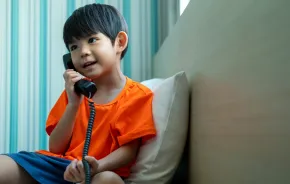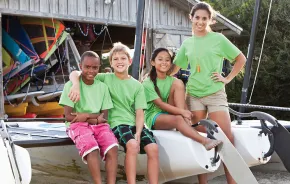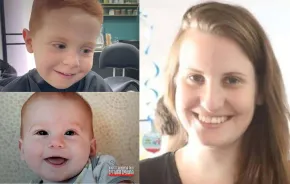
Photo:
How should parents respond to surprising behavior from a child? Photo: iStock
For my younger son, middle school was … rough. Toward the end of the school year I would feel my stomach sink if my phone rang during the school day. I’d put my hand on my phone, close my eyes and repeat (sometimes out loud), “Please don’t be the school, please don’t be the school, please don’t be the school,” before taking a deep breath and looking at the screen. When a friend’s name (or even a random number) came up I felt a huge relief. But when the name of my son’s middle school ran across the screen, I never knew exactly what to expect. I’d take another deep breath, and get ready for the unexpected.
While not all of my son’s indiscretions were that bad, they were always surprising. I often found myself repeating what I was told over the phone, just to make sure I had it right. Because try as a I might, I could never imagine, let alone predict, what he would come up with next.
“He dropped a sandwich down into the center of the cafeteria from a balcony?”
“He and a friend pushed a table into a bathroom?”
While the middle school years are a notoriously tricky time for nearly all kids, at any age or developmental phase you can find yourself asking, “My kid did what?”
As parents, what are we supposed to do when our kids do the unexpected? How are we supposed to respond?
Challenges with kids are the norm, not the exception. Child development is a messy process and we should make space for this and support each other.
Personally, I know I shouldn't overlook this behavior, but I sometimes find it difficult to determine how significant it really is. And why do I feel such intense guilt as a parent, as though his behavior somehow reflects my failure? Are these unexpected events happening because of something I did, or didn’t do?
Clearly, I have a lot of questions, and I am positive I’m not the only one. I was lucky enough to have the opportunity to speak with Karen Pavlidis, Ph.D., and get her expert advice for responding when your child surprises you with the unexpected. Dr. Pavlidis is a licensed psychologist and founder of Child and Teen Solutions, which provides individual therapy, parent-child/family therapy and parenting services.
How to understand unexpected behaviors
Growing up has many ups and downs as children learn and mature. One challenge I have had when my kids do something I don’t expect is knowing whether it’s an indicator of something more serious, or simply part of the (sometimes bumpy) road to growing up.
Dr. Pavlidis says that while everyone has issues and challenges, when behaviors cause dysfunction at home, school or your child’s social life, it might be an indicator of something more.
Dr. Pavlidis used the example of anxiety to explain what a “dysfunction” might look like. “Everyone gets anxious,” she says. “Even though we might get really anxious, we still need to take care of things that are important to us and to our ability to get along in the world. Forging ahead despite anxiety helps us learn that we can stay the course even when things get uncomfortable.”
“Problems come into play when we avoid doing what we need to do because we are anxious. Everyone avoids discomfort to some extent, but kids who are showing social withdrawal or significant avoidance of something that is important to their development—such as school and activities—may have veered off course and need help to get back on track. Or maybe we have a preschooler who, like everyone else at that age, is learning to manage frustration but is having so much difficulty that peers are becoming hesitant to play with the child because of the child’s frustration outbursts. This could be a sign that more is going on than the typical preschooler struggles.”
Different ages, different challenges
Of course, children of different ages are going to throw different challenges your way. While you might be caught off guard when your younger child calls someone a name, your middle-schooler might surprise you with an unusually sassy comeback to a simple request or question. Dr. Pavlidis provided the following helpful context to understand what types of behaviors are typical for kids of various ages:
- Toddler/preschool age: Tantrums and defiance are typical for sure, but by early preschool age, we want kids to be developing the ability to communicate their needs appropriately. By about age 5 we want to see that kids can consider their caregiver’s perspectives at even a basic level. Kids with communication delays or other neurodevelopmental issues might show lags in these kinds of milestones.
- Elementary school age: Social drama is very typical at this age, as is limit-testing with parents. This can be a good time to fine tune household structure and for the adults at home to hold a united front.
- Tweens: Identity development and view of self as separate from parents — eye rolling, sass and attitude. Families can run into trouble if they view these behaviors as problematic or a character problem, when it’s typically a healthy sign of autonomy development. We don’t want to overreact or get punitive around these behaviors.
- Teens: Arguing with parents, minor rule breaking. We want to be careful about dismissing emotional distress as “just hormones.” We always want to take a distressed teen seriously.
What parents should do (and not do)
While I know that my kids will always surprise me and keep me on my toes, the hardest part for me is knowing how to respond when I am truly caught off guard. I don’t want to make something into a larger deal than it should be. I also do not want to ignore behavior that should be addressed.
Dr. Pavlidis says parents should resist the temptation to react in the moment. “Unless there is an immediate safety concern,” she cautions, “wait to respond by first reflecting or talking through how to respond with someone you trust. One of the easiest parenting traps to fall into is responding when we are under the influence of our emotions. We want to step back, tap into our wise mind, and then respond with intention and strategy.”
The best response a parent can give will be one that addresses what exactly has happened, and what the behavior is telling you that the child needs.
Dr. Pavlidis says to keep the following in mind when deciding on a response:
- Do they need to learn better self-control?
- Do they need instruction around developing more skilled ways of getting their needs met?
- Is there something in the environment that needs to change so that the child or teen is better supported?
- Is this an anxious child who needs support around learning that they can handle hard things?
The one thing parents should not do in response to unexpected behaviors may sound a little counterintuitive: Talk.
“When it comes to difficult child behavior, talking often leads parents to dysregulating or co-dysregulating with their kiddo,” she says. “Kids don’t usually respond reasonably to our explanations or entreaties. Even emotion coaching can go south when things are heated. If we can stay regulated when something really hard happens, consider it a win.”
When to seek professional support
It’s also important to recognize that sometimes unexpected behaviors can be an indicator that a child may be struggling with something more significant, and you might want to engage some outside help. Dr. Pavlidis explains that emotion dysregulation at any age is a flag to pay attention to if there are any of the following features:
- Unpredictable tantrums or outbursts (not just when hungry, stressed, tired)
- Aggression (hitting, throwing things)
- Self-harm (even seemingly minor behaviors like hitting or scratching self)
- Prolonged tantrums or outbursts
“For young kids who are showing these kinds of problems in emotion regulation, along with really low frustration tolerance, we call it ‘dysregulated irritability’,” she says. “We can identify these kids at a very young age, and it’s a pretty robust flag for an increased risk of mental health issues down the road. Many people think it’s a sign that there will be problems with acting out behavior but it’s really more of a signal that the child is at risk for things like anxiety, depression and substance abuse in the teen years.”
How to deal with the parental guilt
If I’m honest, the first thing I feel is shame when my child does something our society views as negative, followed closely by guilt.
“Kids with good parents would know not to throw a sandwich off a balcony,” I think to myself. “Have I dropped the ball somehow? What does this say about me as a mom?”
My logical brain might know that he is a 13-year-old kid who is impulsive, testing boundaries and caving to the ridiculous social pressure of middle school. But, my logical brain does not always win.
Unless there is an immediate safety concern, wait to respond by first reflecting or talking through how to respond with someone you trust. One of the easiest parenting traps to fall into is responding when we are under the influence of our emotions.
I asked Dr. Pavlidis why our children’s mistakes often feel like a personal attack or a parenting failure. How can parents deal with those feelings?
“Becoming a parent is the ultimate lesson in humility,” she says. “Many of us are used to being reinforced for our skills and hard work. We live in a culture where perfectionism is rewarded and for many of us, our identity can get really caught up in being a parent. I see all too often that families get isolated and feel ashamed about the hard stuff that is happening with their kids. When messes happen with our kids, it’s hard not to feel that we failed.”
“The truth is,” she continues, “that being a wonderful parent unfortunately does not protect us from having really difficult things from happening. I always want to send the message that challenges with kids are the norm, not the exception. Child development is a messy process and we should make space for this and support each other. If we then add in neurodivergence to the typical challenges of parenting, it can be even harder and more important for parents to find others who know what it’s like and who can offer nonjudgmental support.”
One parenting day at a time
I couldn’t agree more. And now I’m even thankful for those calls from the school. While they might be tough to receive, they did give me the space and time I needed to reflect on what my son had done, talk with my husband, and often a friend as well. While I didn’t always succeed, I was often able to stay regulated and not respond from a place of emotion when he walked through our front door at the end of the day.
I’m not sure what my kids will do next that will catch me off guard, but I know I’m not alone. This thing called parenting is a wild ride, and that knowledge helps me know we’ll make it through.
More ways to support kids through tough moments: |











